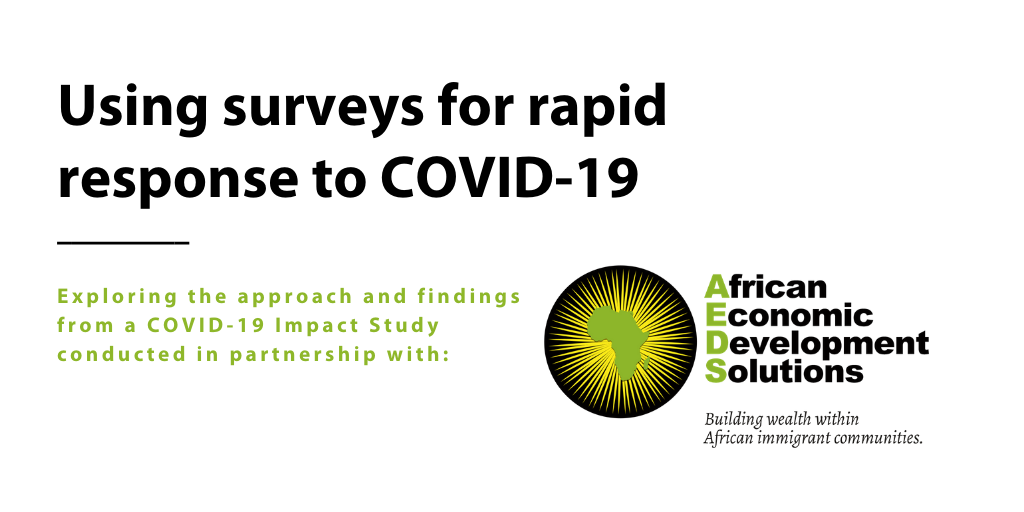
 As we began seeing COVID-19 have more and more of an impact locally, we also began hearing from clients about its impacts to their work. I want to share a story about a partnership with a local nonprofit to use data to inform their COVID-19 community response.
As we began seeing COVID-19 have more and more of an impact locally, we also began hearing from clients about its impacts to their work. I want to share a story about a partnership with a local nonprofit to use data to inform their COVID-19 community response.
At the beginning of the pandemic, we received a call from the Redwood Philanthropic Advisors to do some work for African Economic Development Solutions (AEDS), an organization that supports local African immigrant communities to build wealth through economic development. AEDS was very worried about the 500 businesses they support and wanted to assess the impact of COVID-19 closures on African immigrant-owned businesses, predominantly restaurants, transportation, retail, and home healthcare. Businesses experienced different impacts: restaurants either shut down or were only allowed to offer take out; grocery stores were still open but suffered some shortages and unstable supply lines; and transportation saw sharp deceases as most travel ground to a halt.
Owning a business is one of the few choices left for immigrants if they have limited English language skills. Finding employment is hard, regardless of prior education in their country of origin. Immigrant businesses have grown out of necessity, serving their communities, and later growing to serve wider communities.
To support AEDS’ immediate response to COVID-19, we conducted an impacts survey of thirty Twin Cities African immigrant-owned businesses and found that many were profoundly impacted by COVID-19 and had little in reserves to cushion them from the impact. The survey was deployed online and AEDS provided translation support in responding to the survey as needed. We found sales had fallen, one business permanently closed, 13 temporarily closed, and 16 stayed open but had to scramble to reinvent their businesses to accommodate new rules of operation. For example, some restaurants survived due to increases in takeout orders.
AEDS and Redwood Philanthropic Advisors then requested a solutions-focused survey to elicit the opinions of African immigrant-owned businesses about which interventions they would prefer to help keep their businesses afloat during the COVID-19 crisis. As this survey was in process, these businesses were hit with another challenge. The murder of George Floyd by the Minneapolis police and the subsequent uprising further halted business activities and introduced more uncertainties for businesses in minority communities in the Twin Cities. Several commercial buildings along University Avenue, Lake Street, and Broadway transit corridors—where many immigrant-owned businesses exist—were either damaged or destroyed.
The solutions-focused survey found that despite businesses having sales losses and slower client growth, they were still hopeful and seeking help in developing new business models that involve less client contact. Businesses affirmed that they know that customers are not yet comfortable going out to dine in restaurants and other face-to face interfaces. They recognized that even under Minnesota’s Stay Safe Plan, businesses are not operating at full occupancy, that the public largely still feels unsafe, and that Minnesota is still seeing a steady growth of COVID-19 cases. Survey respondents also had concerns about safety. The uprising resulted in not only damage to buildings, but also in losses in inventory due to looting and efforts to fight fires. Most businesses expressed a preference for zero interest loans or grants.
These survey results will inform AEDS’ response to immediate local and ongoing needs. This is a great story of how using evaluation and research in a rapid response method can help organizations be responsive to the biggest needs. I enjoyed playing a role in this—let me know if you’re interested in similar support for your organization!
To learn more about AEDS and their work, please go to: https://aeds-mn.org/
